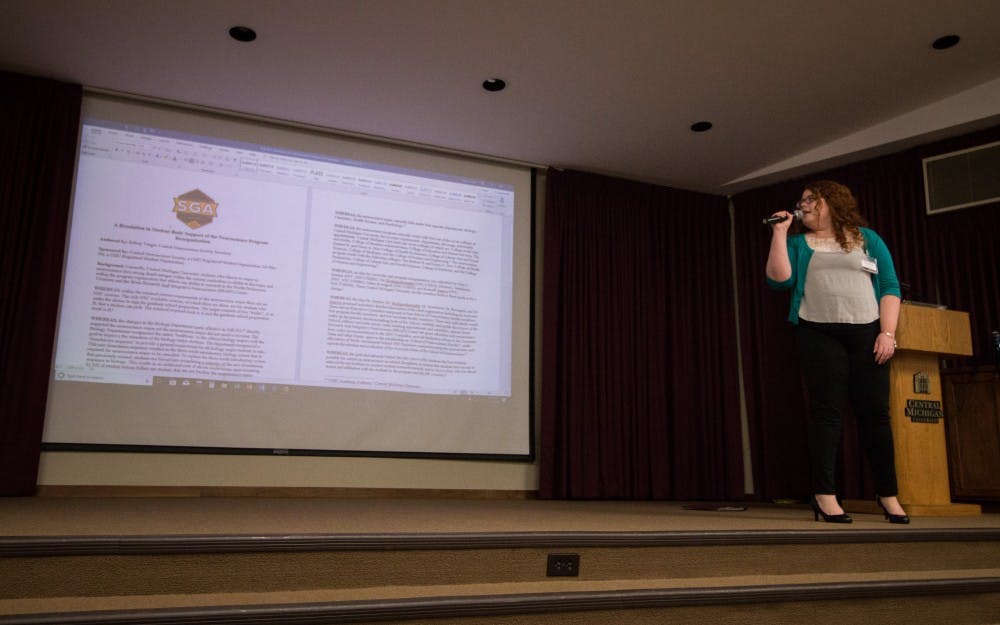Neuroscience reorganization proposed at SGA meeting Nov. 5
Central Neuroscience Society proposed changes to the undergraduate program

Milan junior Kelsey Yarger speaks to Central Michigan University Student Government Association about a proposal to reorganize the neuroscience program on Nov. 5 in the Bovee University Center Auditorium.
The Central Neuroscience Society is pushing for changes to the Central Michigan University undergraduate neuroscience program, a potential reorganization that has long been up for debate.
The proposed reorganization would include the creation of an official School of Neuroscience, as well as proposed foundational courses that would fall under specific neuroscience (NSC) course designators.
At this time, there are no available NSC course designators within the non-graduate preparatory undergraduate requirements of the major.
Milan junior Kelsey Yarger, Central Neuroscience Society secretary, introduced new legislation to Student Government Association which seeks support of the proposal, "A Resolution in Student Body Support of the Neuroscience Program Reorganization," during SGA's Senate and House meetings on Monday, Nov. 5 in the Bovee University Center.
Student Government Association meets at 7 p.m. Mondays in the Bovee University Center Auditorium. Meetings are free to attend, but students must bring their CMU Global ID cards to check in prior to entering.
SGA Senate and House will vote next week whether or not to support the legislation.
"A broken major"
The neuroscience program currently falls under four separate departments: biology, chemistry, health sciences and psychology.
Yarger compared the current state of the neuroscience program to "a bag of broken and misplaced bones."
"My major is made up of biology courses, psychology courses, health sciences courses, however, no neuroscience courses," Yarger said. "I'm a firm believer that as a student, if I'm paying for a degree in neuroscience, I should have time in the classroom to learn about neuroscience."
The legislation states that CMU students majoring in neuroscience face strong disadvantages within the current curriculum available in the major.
When changes to curriculum in the biology department went into effect last year, the neuroscience major was also directly impacted, according to the legislation.
The biology department reorganized a biology "foundations sequence," which led to the cancellation of a three-credit introductory biology course required for the neuroscience major. To replace these credits, students are forced to complete additional biology credits, approximating $3,500 of student tuition dollars per student, the legislation states.
To help combat this, the legislation proposes a curriculum change that would transfer material of the current major into newly-created neuroscience courses. This would include an introductory neuroscience course, a foundations course and a methods course.
The legislation states the execution of curricular reorganization would be revenue neutral for CMU, as student tuition dollars that would have gone to biology, psychology, or chemistry would be transferred to neuroscience.
Student opinion
SGA House Representative Daniel Dahlstrom, a neuroscience major himself, thinks the proposed introductory neuroscience courses are highly necessary for the continued success of the program.
"Coming from experience, I struggled trying to find out which classes I’m supposed to take for the neurosciences major," he said.
Dahlstrom said he plans to vote in support of the legislation next week.
"The neuroscience major and its students deserve the best system to prepare them, whether they go to graduate school or not," he said.
However, Senator Jonathan Korpi said he will not be voting in support of the legislation due to the lack of support he sees in his own program.
"I can’t support this because there are other programs outside the biology department who need more support," the graduate student said. "I can’t say I support this when my own department, the history department, is understaffed."
While the legislation is sponsored by the Central Neuroscience Society and Nu Rho Psi, Senator Mary Chiejina said she believes it could receive more support. She suggested Yarger reach out to more organizations for sponsorship.
"I feel like a lot more colleges and RSOs would be interested in helping you by sponsoring (the legislation)," Chiejina said. "With the recent academic reorganization, I feel like a lot of people will understand where you’re coming from."
A proposal to reorganize the neuroscience program was introduced to the academic reorganization committee in fall 2017, but the proposal did not make it into final reorganization plans.
Yarger said she is not aware of why the neuroscience program didn't see any changes from the academic reorganization.
Faculty have been hoping to expand the program since 2013, when it was named Undergraduate Program of the Year by the Society for Neuroscience, the world's largest organization of scientists and physicians in the field of neuroscience, Central Michigan Life reported last year.
With the potential support of SGA, the Central Neuroscience Society hopes to take this proposal to the CMU Board of Trustees in December.



